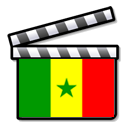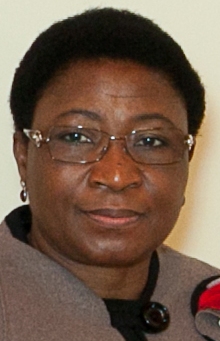Related Research Articles

The music of Burkina Faso includes the folk music of 60 different ethnic groups. The Mossi people, centrally located around the capital, Ouagadougou, account for 40% of the population while, to the south, Gurunsi, Gurma, Dagaaba and Lobi populations, speaking Gur languages closely related to the Mossi language, extend into the coastal states. In the north and east the Fulani of the Sahel preponderate, while in the south and west the Mande languages are common; Samo, Bissa, Bobo, Senufo and Marka. Burkinabé traditional music has continued to thrive and musical output remains quite diverse. Popular music is mostly in French: Burkina Faso has yet to produce a major pan-African success.

Cinema of Africa covers both the history and present of the making or screening of films on the African continent, and also refers to the persons involved in this form of audiovisual culture. It dates back to the early 20th century, when film reels were the primary cinematic technology in use. During the colonial era, African life was shown only by the work of white, colonial, Western filmmakers, who depicted Africans in a negative fashion, as exotic "others". As there are more than 50 countries with audiovisual traditions, there is no one single 'African cinema'. Both historically and culturally, there are major regional differences between North African and sub-Saharan cinemas, and between the cinemas of different countries.

Fanta Regina Nacro is well known for being the first woman from Burkina Faso to direct a feature film and is a founding member of the Guilde Africaine des Realisateurs et Producteurs. She is an artist who explores the themes of African cinema while tackling issues surrounding illness such as AIDS, and education for the girl child. She represents the "New African Wave". Nacro's films tend to question the traditions of Burkina Faso, while looking at the relationship between tradition and modernity in today's world.

The Central Bank of West African States is a central bank serving the eight west African countries which share the common West African CFA franc currency and comprise the West African Economic and Monetary Union.
United Artists for African Rap is a collective of 17 hip hop artists coming from ten different countries in West Africa and who are committed to use their voices and music for Africa’s development. With the support of the Non Governmental Organization PLAN International, they are engaged in a public awareness campaign relating to Children’s rights and youth problems. With respect, they realized in 2006 the first ever hip hop musical comedy show “The extraordinary Stories of Poto-Poto Children”.
The Grand prix littéraire d'Afrique noire is a literary prize presented every year by the ADELF, the Association of French Language Writers for a French original text from Sub-Saharan Africa. It was originally endowed with 2,000 french francs.

The cinema of Senegal is a relatively small film industry which experienced its prime from the 1960s through to the early 1980s, but has since declined to less than five feature films produced in the last ten years. Senegal is the capital of African cinema and the most important place of African film production after its independence from France in 1960.
Mahama Johnson Traoré (1942–2010) was a Senegalese film director, writer, and co-founder of the Ouagadougou-based Pan-African Cinema Festival (FESPACO).

Monique Ilboudo is an author and human rights activist from Burkina Faso. As of 2012, she was Ambassador Extraordinary and Plenipotentiary of Burkina Faso to the Nordic and Baltic countries.
Anne-Laure Folly is a documentary film maker from Togo.
Les Oubliées is a 1996 documentary film directed by Anne-Laure Folly of Togo and shot in Angola.
This is a list of the Cape Verde national football team results from 2000 to 2019.
The Ghana women's national football team represents Ghana in women's association football and is administered by the Ghana Football Association (GFA); the association is affiliated to the Confederation of African Football (CAF). Football has been played in the country since 1903, organised by the national association since 8 September 1957. In 1991, the Black Queens were "hurriedly assembled" ahead of their first official match during the qualifying rounds for the 1991 FIFA Women's World Cup, a 5–1 defeat against Nigeria on 16 February 1991 — the first women's association football match on African ground.
The WAFU Zone B Women's Cup is a women's association football competition contested by national teams of Zone B of the West African Football Union.
Mariama Suzanne Konaté Maïga is a Malian medical doctor and public health administrator who served as Mali's secretary of state for social action and the promotion of women in 1991 to 92. She also worked for the United Nations Population Fund.
In this article, NGOs in West Africa will be divided into three categories: African national NGOs, African international NGOs, and non-African international NGOs. NGOs stand for non-governmental organizations. These organizations are mostly non-profit and mostly work independently from the government, they have specific aims that range from human rights, finance, health, education and more. There are many non-governmental organizations in West Africa, and much activity between these countries, organizations and the rest of the world.

This is a list of the Angola national football team results from 2000 to 2019.
The Burkina Faso women's national football team is the representative women's association football team of Burkina Faso. Its governing body is the Burkinabé Football Federation (FBF) and it competes as a member of the Confederation of African Football (CAF).
References
Citations
- 1 2 3 Femmes aux yeux ouverts - California Newsreel.
- ↑ Thackway 2003, p. 191.
- 1 2 Anne Laure Folly - WMM.
- ↑ Thackway 2003, p. 156.
- ↑ Curry 2004, p. 86.
- ↑ Thackway 2003, p. 157.
- ↑ Harrow 1999, p. 235.
- ↑ Harrow 1999, p. 2385.
Sources
- "Anne Laure Folly". Women Make Movies. Retrieved 2013-02-08.
- Curry, Ginette (2004-01-01). Awakening African Women: The Dynamics of Change. Cambridge Scholars Press. ISBN 978-1-904303-34-3 . Retrieved 2013-02-08.
- "Femmes aux yeux ouverts". California Newsreel. Archived from the original on 29 April 2013. Retrieved 28 December 2012.
- Harrow, Kenneth W. (1999). African Cinema: Postcolonial and Feminist Readings. Africa World Press. p. 235. ISBN 978-0-86543-697-8 . Retrieved 9 February 2013.
- Thackway, Melissa (2003). Africa Shoots Back: Alternative Perspectives in Sub-Saharan Francophone African Film. Indiana University Press. ISBN 978-0-253-34349-9 . Retrieved 2013-02-08.
External links